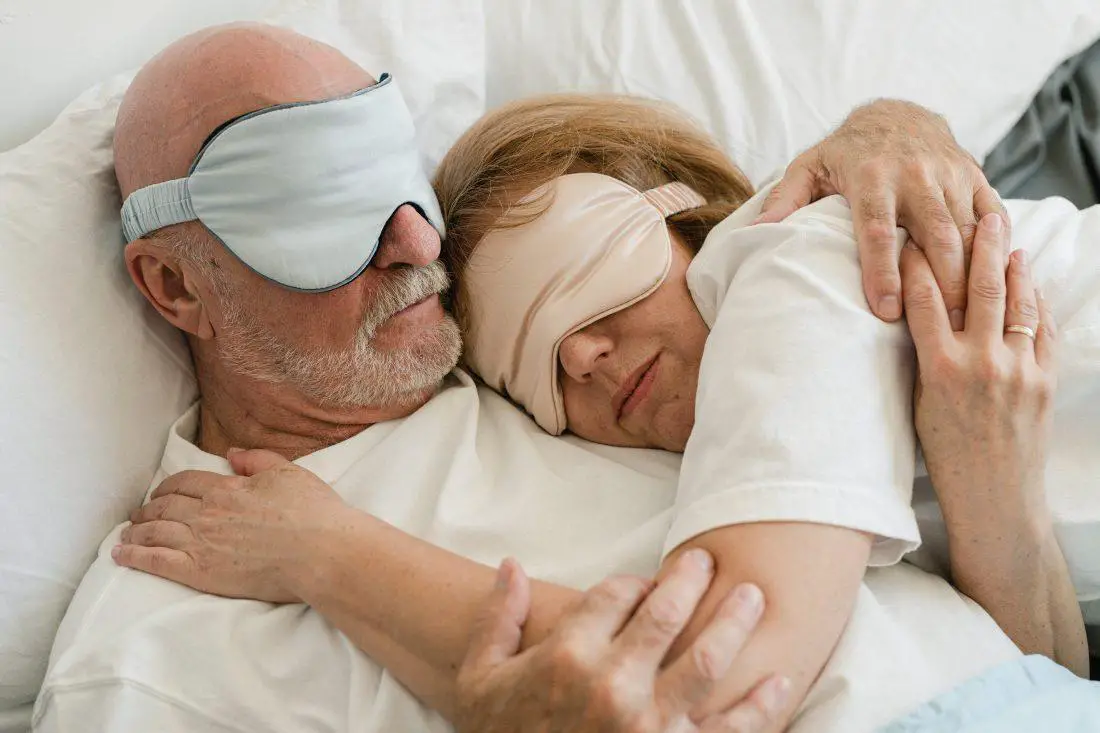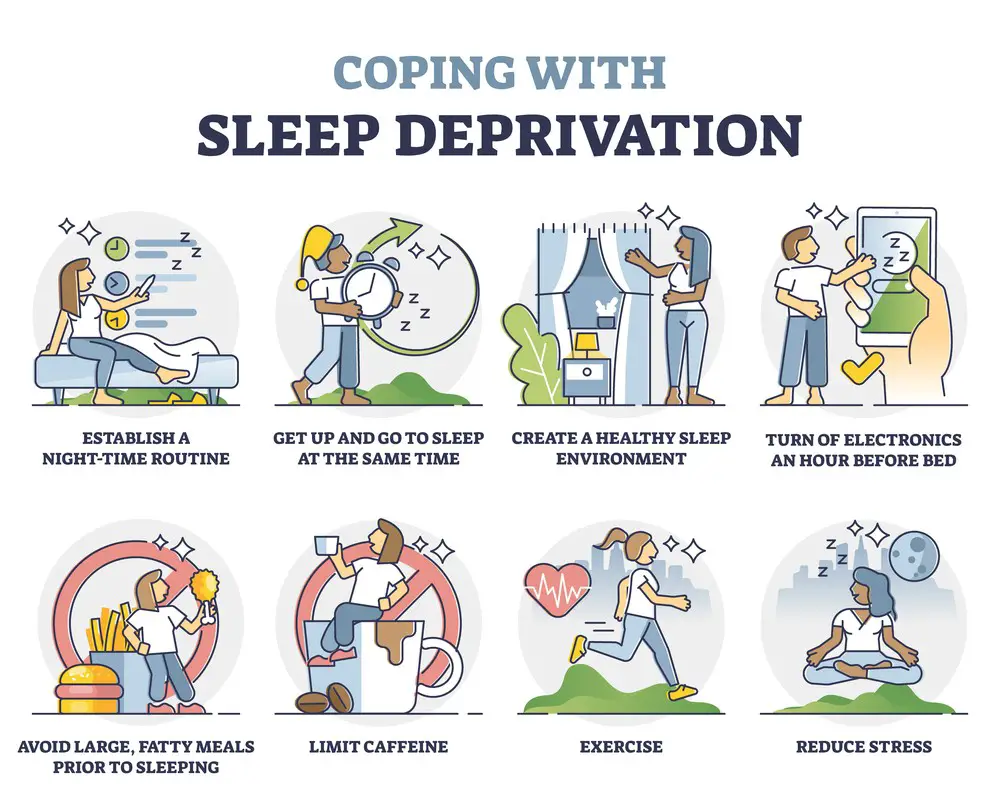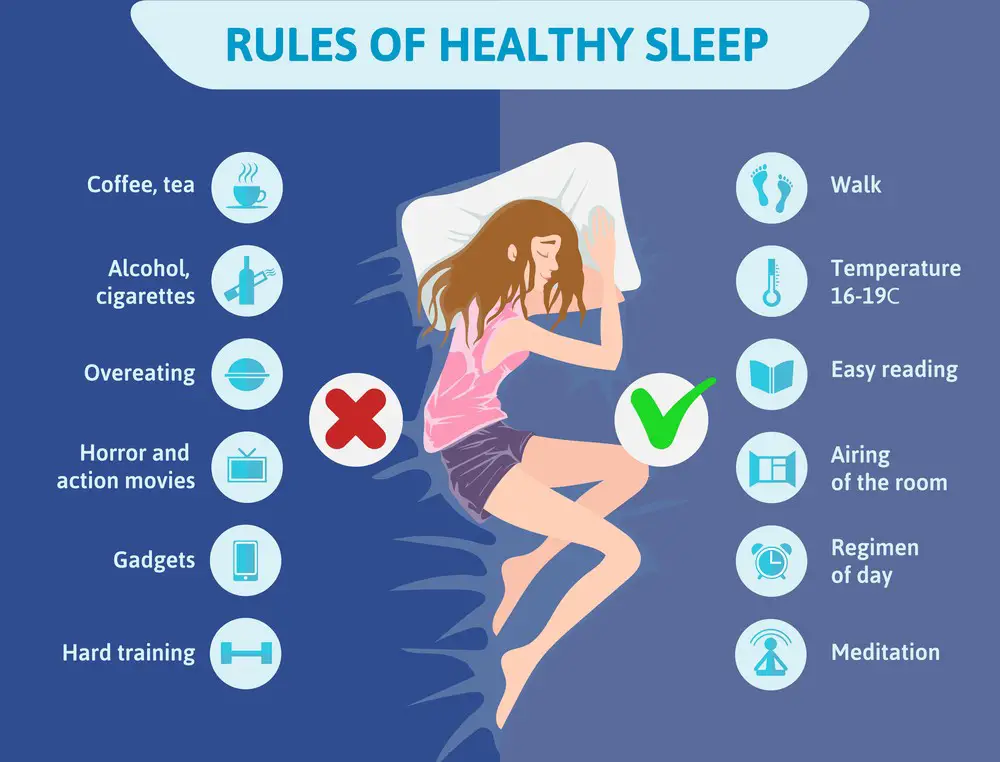As a BetterHelp affiliate, we receive compensation from BetterHelp if you purchase products or services through the links provided
Sleep is a fundamental pillar of human well-being, nurturing the body and mind. It is a time when the body recharges and the mind rejuvenates. That makes it essential for maintaining physical health, emotional balance, and cognitive function. However, as we age, sleep quality and quantity often become elusive, which is faced by many elderly individuals.
For seniors, a peaceful night’s sleep can be a precious commodity. However, it is often disrupted by various factors like chronic health conditions, medication side effects, or the natural aging process.
In this article, we’ll offer some tips for older adults to enhance sleep quality and reap its numerous benefits.
 1. Create a Relaxing Bedtime Routine
1. Create a Relaxing Bedtime Routine
According to HelpGuide.org, sleep needs differ, but generally, most people need between seven to nine hours of nightly rest. However, it’s the quality of sleep, and how you feel upon waking that matters more than a specific duration. Therefore, one of the best things you can do to improve sleep quality is to create a relaxing bedtime routine.
To establish a relaxing bedtime routine, maintain a consistent sleep schedule, even on weekends, to regulate your body’s sleep-wake cycle. Enjoy a warm bath or shower in the evening to ease muscle tension. Before sleep, engage in soothing activities like reading or listening to calming music. Avoid electronic devices with disruptive blue light.
Ensure a dark, quiet, and cool sleeping environment, as these conditions promote melatonin production and minimize disruptions. Lastly, avoid caffeine and alcohol before bedtime to prevent sleep disruptions and ensure a peaceful night’s rest.
2. Optimize the Sleep Environment
To optimize their sleep environment, elderly people should ensure their bedroom is dark. They can use blackout curtains or blinds to block outside light and promote melatonin production. Keeping the bedroom quiet is crucial, so employ a white noise machine or a fan to mask external noise disturbances.
The bedroom temperature is a crucial factor in optimizing the sleeping environment. Research indicates that extreme temperatures, either too hot or too cold, can have a detrimental effect on sleep quality.
Suboptimal sleep quality was more frequently associated with environments considered “too hot.” The source recommends a cool bedroom temperature between 68 and 77 degrees Fahrenheit for an ideal sleep environment.
For quality sleep, maintain a calm, dark, and quiet environment, underscoring the significance of temperature control for restful nights.
3. Consider Dietary Considerations for Better Sleep
For improved sleep, dietary choices are crucial. A nutritious diet, including fruits, vegetables, whole grains, protein, and healthy fats, improves well-being and supports quality sleep. Avoiding caffeine and alcohol in the hours leading up to bedtime is essential, as these substances can disrupt sleep. Choose a light dinner for easy digestion, and avoid sugary foods that lead to blood sugar spikes, hindering sleep.
Beyond general dietary guidelines, certain foods and nutrients can aid sleep. Tryptophan, found in turkey, chicken, fish, eggs, dairy, nuts, and seeds, is converted into melatonin, a sleep-regulating hormone. Magnesium, abundant in leafy greens, nuts, seeds, and whole grains, supports sleep. Vitamin B6, sourced from poultry, fish, whole grains, bananas, and potatoes, aids melatonin production.
 4. Do Some Physical Activity
4. Do Some Physical Activity
Regular physical activity is a powerful tool for improving sleep, and this holds for older adults as well. Exercise not only contributes to better physical health but also has a profound impact on sleep quality and patterns.
As per a National Institute of Health study, physical activity offers multiple benefits for improved sleep. It boosts melatonin production, facilitating quicker and better sleep onset. Also, it reduces stress, a common obstacle to both falling asleep and maintaining restful slumber. These findings highlight how vital regular exercise is for improving sleep patterns among seniors and fostering better sleep at home.
Regular, low-impact exercise is key for improving sleep in seniors, including activities like walking, swimming, and gentle stretching. Timing is crucial, with vigorous exercise best completed a few hours before sleep to prevent stimulation.
5. Consider Hiring an Expert Home Care Nurse
Older adults often have unique healthcare needs that require specialized attention, making the role of a home care nurse invaluable. These healthcare professionals provide personalized care in the familiar and comforting environment of one’s home. Their expertise extends beyond general caregiving, encompassing medication management, monitoring vital signs, and ensuring that older individuals receive the best care.
When considering hiring an expert home care nurse for an older individual, several factors should be considered. Check the nurse’s state license for qualifications and inquire about their expertise in sleep issues, especially sleep disorder training. Also, interview the nurse to establish a sense of comfort and confidence in their ability to provide the required care.
St. Joseph’s College of Maine highlights the demand for new registered nurses. The U.S. BLS predicts a 6% growth in nursing jobs by 2031. It is attributed to retirements and an aging patient population, resulting in approximately 195,400 new positions. Due to this data, a surge has been witnessed in the number of aspiring nurses.
Individuals interested in becoming a home care nurse have many paths nowadays. One option is to complete an accredited associate degree in nursing (ADN) program, which typically takes two years.
However, for those who seek a fast track to become a nurse to provide home care, there are accelerated nursing programs available. Accelerated nursing programs offer in-depth training in a shorter duration, preparing future nurses to care for older patients effectively.
6. Manage Medications and Health Conditions
Age often comes with a greater prevalence of chronic health issues and medications to manage them. These factors can have a profound impact on sleep quality.
To enhance sleep, managing medications and health conditions is vital. Consult healthcare professionals regularly to assess and modify medications, especially those that may affect sleep. Effectively managing chronic conditions through prescribed treatments and lifestyle changes can improve sleep quality.
Also, timely medication dosages can minimize disruptions, considering their potential to cause drowsiness or stimulation. Staying informed about medication side effects helps individuals make informed treatment decisions.
7. Use Stress Reduction and Relaxation Techniques
Stress reduction and relaxation play a pivotal role in senior sleep improvement. Encourage mindfulness meditation and deep breathing to calm the mind. Guided muscle relaxation exercises can release physical tension, promoting relaxation and sleep.
Creating a bedtime routine with calming activities signals the body to wind down. Reducing stimulants like caffeine and nicotine, particularly before bedtime, helps alleviate stress and improve sleep.
Incorporating stress reduction and relaxation techniques offers relief from stress and anxiety, fostering more restful nights for seniors. Improved sleep patterns enhance overall well-being at home.
To Conclude
In the quest for a good night’s sleep, the seniors often face unique challenges. However, time-tested strategies explored in this article can make a world of difference. Sleep is not just a luxury but a vital component of well-being, especially for seniors.
Implementing these strategies allows you to positively impact the lives of your senior family members and friends significantly. The reward is not just a restful night’s sleep but a renewed sense of vitality and well-being. Remember, quality sleep is a gift that keeps on giving, and with these strategies, you can offer that gift to the seniors.
- 7 Ideas to Help You Relax and Unwind on a Family Vacation - April 27, 2025
- How Having Cybersecurity Protection Helps You Relax - April 25, 2025
- 8 Reasons Why Spending Time Outside Calms You Down - April 25, 2025
This site contains affiliate links to products. We will receive a commission for purchases made through these links.


 1. Create a Relaxing Bedtime Routine
1. Create a Relaxing Bedtime Routine 4. Do Some Physical Activity
4. Do Some Physical Activity
